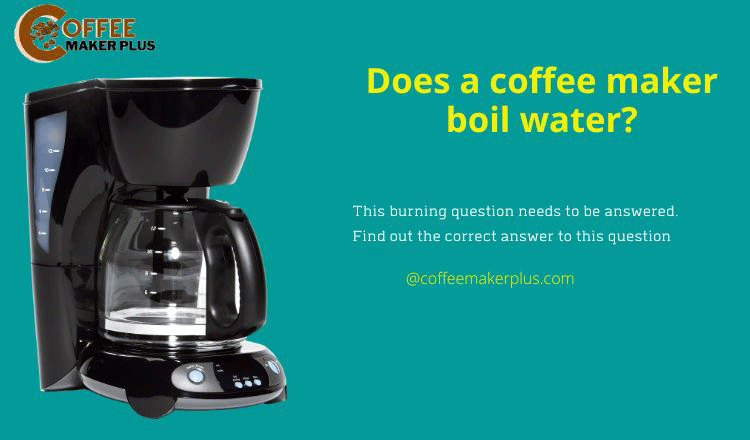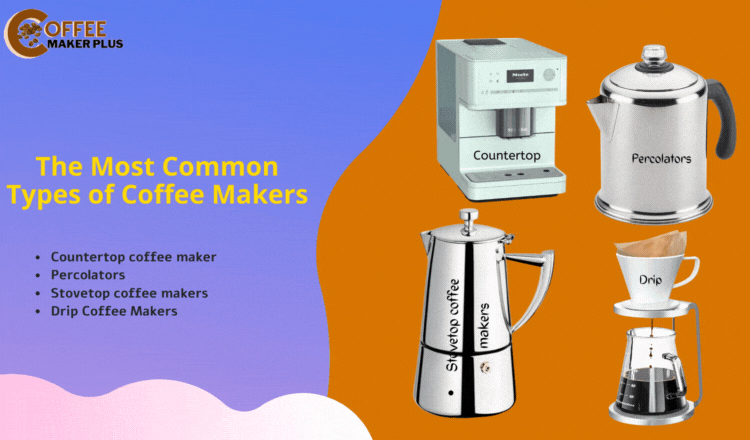
When you make coffee, you know that your coffee is hot enough to drink. This may lead you to wonder: Does a coffee maker boil water? This burning question needs to be answered. We will try to answer this question in this article.
Coffeemakers don’t usually boil water. Meanwhile, some coffee makers brew water at temperatures between 180°F and 205°F. It is interesting to note that water’s boiling point is 212°F, which is very close to the temperature at which a coffee maker heats the water. If you have a stovetop coffee maker, you can boil water there.
How does a coffee maker heat water? Keep reading to learn more about using hot or cold water in your coffee maker. And whether or not the water is heated to kill bacteria in the coffee maker, etc.
Table of Contents
- The Heat That Coffee Makers Can Produce
- The Most Common Types of Coffee Makers
- How does the coffee maker heat the water?
- Does a coffee maker heat the water to kill bacteria?
- What are alternative ways of boiling water?
- Should you use hot or cold water in the coffee maker?
- Can you leave water in a coffee maker for a long time?
- Do coffee makers need water filters?
- Conclusion:
- FAQs
The Heat That Coffee Makers Can Produce
As a matter of fact, water heats up at 212 degrees Fahrenheit; however, low air pressure can cause water to boil at low temperatures. In low-air-pressure areas, water can boil at 202°F. When atmospheric pressure is low, water boils at a lower temperature.
Although coffee makers do not boil water, they can get it as close to the boiling point as possible. Typically, coffee makers heat water from 180 degrees to 205 degrees F. This temperature range produces the ideal blend for extracting flavor from ground beans. This temperature has been defined as standard by different experts for making coffee.
Coffee makers are ostensibly designed to make coffee, but they can also be used for other purposes. You can also make warm tea or hot chocolate with a coffee maker. Alternatively, if you need hot water, you can heat the water almost to boiling point. This means that you can use the coffee maker for many purposes.
The Most Common Types of Coffee Makers

Most people use 4 different types of coffee makers.
- Countertop coffee maker
- Percolators
- Stovetop coffee makers
- Drip Coffee Makers
Stovetop coffee makers produce thicker and stronger-tasting coffee. While percolators don’t produce the best-tasting coffee, You can use these alternatives when you don’t have access to a countertop coffee maker, such as when you want to make coffee while traveling or camping.
Drip coffee makers run the water once, resulting in a brew that isn’t too strong. Pour-over brewing is considered the most effective method of making coffee. This method uses a kettle to boil water instead of a regular coffee maker.
The average lifespan of a coffee maker is about five years if it is taken care of properly. Check the original packaging, manual, or product description online to determine if your coffee maker has a warranty.
How does the coffee maker heat the water?
In most coffee makers, water has to pass through a metal tube before being carried to the basket with the filter and grounds. When the basket is empty, you will only receive hot water. Through the metal tube, the water is heated before entering your coffee grounds. Since the tube is smaller, it heats the water faster.
Does a coffee maker heat the water to kill bacteria?
Since the coffee maker does not heat the water to a temperature high enough to boil, bacteria cannot be eliminated. Water must reach 212°F to kill bacteria. Water that has been boiled will also inactivate any viruses that may be present.
What are alternative ways of boiling water?
You can use a microwave if you need to boil water, but don’t have a stove or pot. Microwaves are capable of boiling water in just two to three minutes. Microwaves with 1,000 watts take about two minutes to boil water, while microwaves with 1,200 watts take about a minute and a half.
Another way to boil water is with a pot or electric kettle. The pot you use on your stove works perfectly. Approximately 2 minutes are needed to boil a cup of water on a stove. For 4 cups of water, this takes 8-10 minutes.
Should you use hot or cold water in the coffee maker?
The material of your coffee maker determines whether you should use boiling or cold water. You should not pour hot water into your coffee maker because hot water can dissolve contaminants in pipes more quickly than cold water.
Normally, you should use cold water in your coffee maker. However, some coffee makers are only designed to make cold brews. In all other cases, it is preferred to use room-temperature water.
Can you leave water in a coffee maker for a long time?
Most people leave water in their coffee maker overnight with a timer set for the next morning or have it ready to use. It’s easy and can save time; however, this method is not ideal. You should know that bacteria can build up in your coffee maker’s water tank. Therefore, you should not leave water in your coffee maker tank for longer than ten hours.
In addition, leaving water in your coffee maker’s water tank can have unintended consequences. Water has the potential to become “stale” quickly, resulting in your coffee not tasting as good as it would otherwise. Furthermore, water contains minerals that can leave behind a residue in reservoirs or cafes if you keep the water in them for a long period.
When it comes to the Keurig, you shouldn’t leave water in the reservoir for more than 48 hours. It is a fact that bacteria thrive in warm and moist environments. Dumping and refilling the reservoir if you leave water in it for more than 48 hours is necessary. For all coffee brewers, unless otherwise specified, this should be considered because you don’t want to drink bacteria that could be harmful.
Do coffee makers need water filters?
You don’t necessarily need a water filter for your coffee maker. Coffee makers do not purify water. Make sure you use filtered water when making coffee. It will ensure that you end up with a clean cup of coffee.
Some high-end coffee makers have filters that contain carbon and organic compounds. Combining filtration with carbon and organic compounds kills all types of bacteria. You can also boil tap water before pouring it into your coffee maker.
When it comes to drinking water, filtered water works best. Boiling water does not destroy minerals, but it does kill bacteria.
Regularly clean your coffee maker, including the lid and camping basket. It will improve your coffee’s flavor. The components of your coffee maker will become dirty if they are not cleaned regularly. Those residues can make your coffee taste terrible. It’s smart to keep your coffee maker’s components clean and well-maintained to avoid bacteria and get the best-tasting coffee. The purpose of filtering out impurities is to help maintain the machine and improve the taste of the coffee.
The ideal way to make pure coffee is to use distilled water. Unlike purified water, distilled water contains no minerals or impurities. Purified water is made up of distillate and spring water. As a result, spring water is not recommended since it still contains more minerals than tap water. These mineral deposits can harm your coffee maker.
Conclusion:
In conclusion, I hope you found this article helpful. You probably know that coffee makers don’t boil water. Despite that, they produce temperatures between 180°F and 205°F. It is impossible to kill bacteria with water heated by a coffee maker. Leaving the water in the coffee maker overnight is fine, but don’t allow it to go beyond eight to ten hours. You will obtain the best results using filtered water for your coffee.
FAQs
Does a coffee maker sterilize water?
Coffee makers usually do not purify the water. However, we can take steps to use high-quality water, such as distilled or filtered water, for pure coffee. It is also imperative to clean your coffee maker regularly.
Is it possible to boil water in a percolator?
Yes, you can boil water in a percolator. A stove or fire heats the water in the percolator’s bottom chamber. The water at the bottom of the chamber is heated and begins to boil.
Can a microwave boil water?
Yes, water can be boiled in the microwave using a microwave-safe container. It takes only 2 to 3 minutes to boil a cup of water.